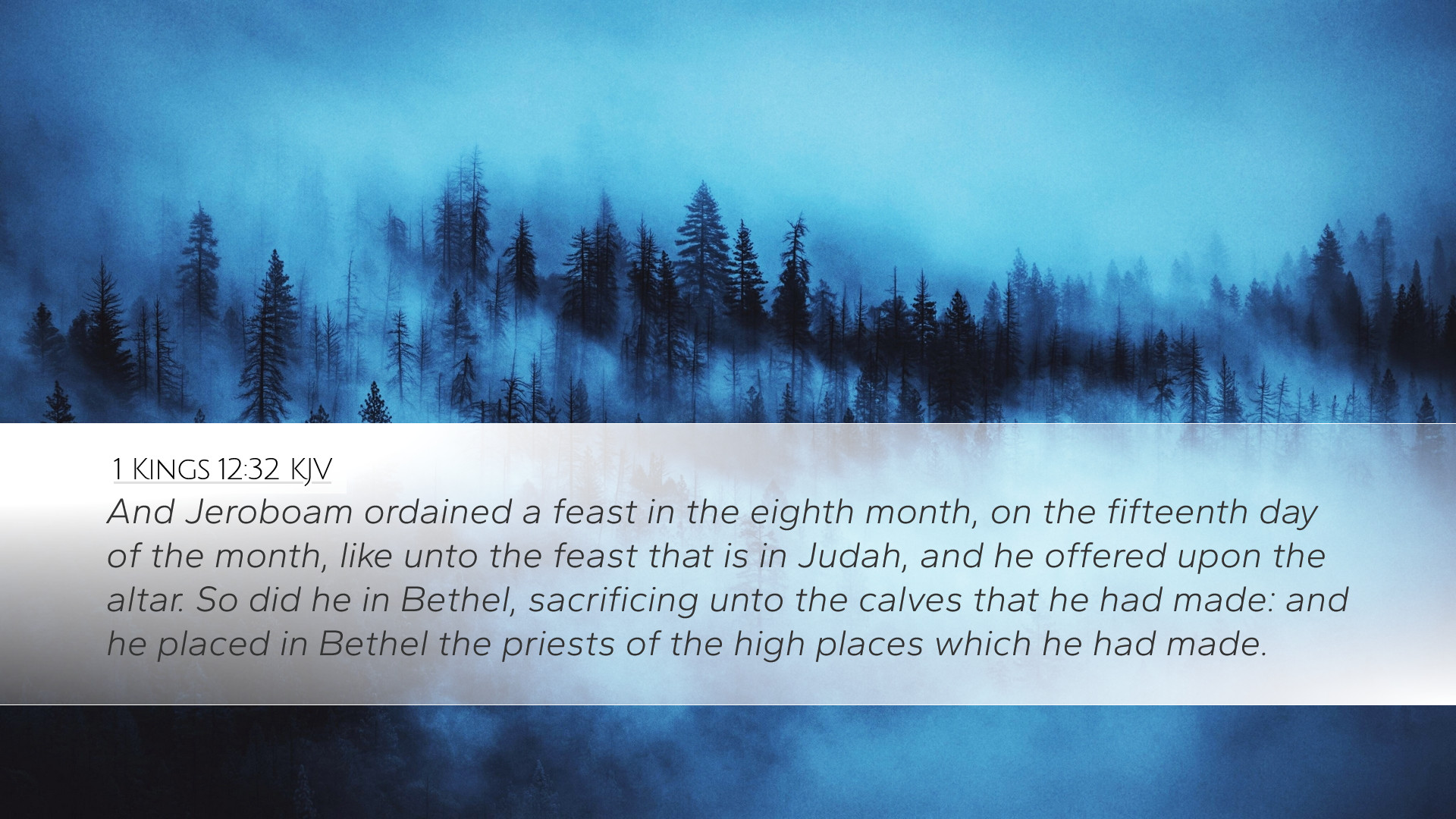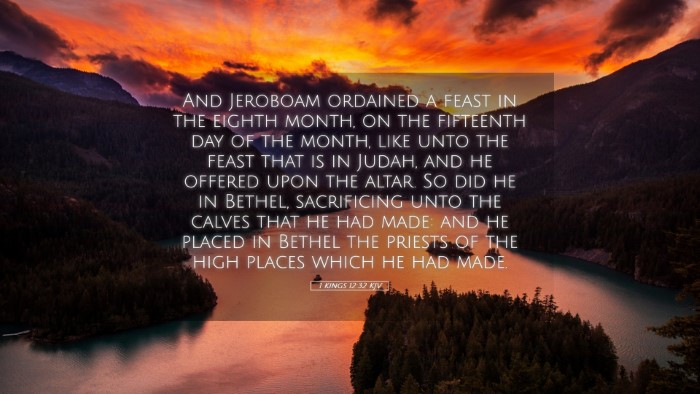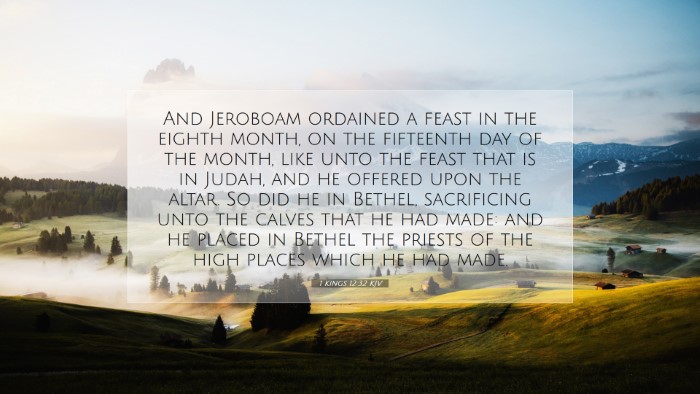Commentary on 1 Kings 12:32
Verse: 1 Kings 12:32 - "And Jeroboam ordained a feast in the eighth month, on the fifteenth day of the month, like unto the feast that is in Judah, and he offered upon the altar. So did he in Bethel, sacrificing unto the calves that he had made: and he placed in Bethel the priests of the high places which he had made."
Introduction
This passage in 1 Kings represents a critical moment in the history of Israel after the division of the kingdom. Jeroboam, having been consecrated king over the northern tribes, takes measures to solidify his rule and establish a form of worship that deviates from the prescribed practices of Judah. This commentary synthesizes insights from Matthew Henry, Albert Barnes, Adam Clarke, and other public domain sources to elucidate the theological and historical significance of this verse.
The Historical Context
After King Solomon's reign, Israel was divided into two kingdoms: the northern kingdom of Israel under Jeroboam and the southern kingdom of Judah under Rehoboam. The site of worship was critical for national identity, as the Temple in Jerusalem was the focal point for worship and sacrifice. Jeroboam’s decision to create alternative religious practices is rooted in his fear of losing his newly acquired authority and the loyalty of the people.
Jeroboam’s Political Strategy
Fear of Losing Authority: Jeroboam’s actions can be interpreted as politically motivated. He feared that if the people continued to go to Jerusalem for religious festivals, their allegiance would shift back to Rehoboam. Matthew Henry notes that Jeroboam “thought it necessary to establish a new religion to secure his throne.”
Creating a Rival Feast: Jeroboam instituted a feast in the eighth month, which mimicked the Feast of Tabernacles (Sukkot) celebrated by the Israelites in Judah. Albert Barnes comments on this imitation, highlighting Jeroboam’s intent to “prevent his subjects from going to Jerusalem by offering them an equivalent” in his kingdom, thus politicizing worship.
Theological Implications
Idolatry and Its Consequences: Jeroboam’s action of offering sacrifices to the golden calves signifies a deviation from the true worship of Yahweh. Adam Clarke emphasizes that this was not merely a political move but also a blatant act of idolatry, which would have catastrophic implications for Israel. His establishment of alternative worship practices introduces a long-standing issue of syncretism in Israel.
Legitimate vs. Illegitimate Worship: The presence of the calves in Bethel is emblematic of a deeper theological crisis. Jeroboam attempted to provide a façade of legitimate worship while wholly violating God’s commandments. Matthew Henry warns, “Worship must be regulated by the Word of God, not by human wisdom or expediency.”
The Role of the Priests
Jeroboam placed priests in the high places he established, which further underscores his intent to legitimize his version of worship. By appointing priests from every class rather than from the line of Aaron, Jeroboam disregarded God’s specific instructions for priestly ordination.
Devaluing the Priesthood: Albert Barnes asserts that by appointing common men as priests, Jeroboam not only undermined the established priesthood but also facilitated the spread of his idolatrous practices. This act corrupted the priestly norms and contributed to the spiritual decline of Israel.
The Significance of Bethel
Bethel was an important site in Israel’s history, being associated with the patriarchs and earlier worship practices. However, Jeroboam’s actions led to a redefinition of this sacred space into a site of idolatry.
Bethel as a Symbol: As noted by Adam Clarke, Bethel, known as “the house of God,” ironically becomes a center for the worship of false gods. This act represents a significant departure from the heritage of Israel and highlights the consequences of abandoning true worship.
Judgment and Consequences
Jeroboam’s choices set the stage for God's judgment on the northern kingdom. The establishment of alternative worship practices led to spiritual decay, culminating in eventual exile and the downfall of Israel.
Warnings for Today's Believers: The passage serves as a poignant warning about the nature of idolatry and the importance of fidelity to God’s Word. Contemporary believers and leaders are called to assess their own practices in worship and ensure they align with biblical teachings to avoid the pitfalls seen in Jeroboam’s reign.
Conclusion
The actions of Jeroboam as recorded in 1 Kings 12:32 hold significant lessons for pastors, theologians, and scholars today. They reflect broader themes of leadership, worship, and fidelity to God. Though aimed at securing political power, Jeroboam’s reforms led to spiritual destruction; reminding us of the crucial interplay between faithfulness to God’s commandments and the health of God’s people. As Matthew Henry cogently states, “Religion must not be modelled to please men, but must be a compliance with God’s will.”


